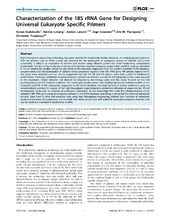| dc.contributor.author | Hadziavdic, Kenan | eng |
| dc.contributor.author | Lekang, Katrine | eng |
| dc.contributor.author | Lanzén, Anders | eng |
| dc.contributor.author | Jonassen, Inge | eng |
| dc.contributor.author | Thompson, Eric | eng |
| dc.contributor.author | Troedsson, Christofer | eng |
| dc.date.accessioned | 2015-03-06T09:49:30Z | |
| dc.date.available | 2015-03-06T09:49:30Z | |
| dc.date.issued | 2014-02-07 | eng |
| dc.identifier.issn | 1932-6203 | en_US |
| dc.identifier.uri | http://hdl.handle.net/1956/9472 | |
| dc.description.abstract | High throughput sequencing technology has great promise for biodiversity studies. However, an underlying assumption is that the primers used in these studies are universal for the prokaryotic or eukaryotic groups of interest. Full primer universality is difficult or impossible to achieve and studies using different primer sets make biodiversity comparisons problematic. The aim of this study was to design and optimize universal eukaryotic primers that could be used as a standard in future biodiversity studies. Using the alignment of all eukaryotic sequences from the publicly available SILVA database, we generated a full characterization of variable versus conserved regions in the 18S rRNA gene. All variable regions within this gene were analyzed and our results suggested that the V2, V4 and V9 regions were best suited for biodiversity assessments. Previously published universal eukaryotic primers as well as a number of self-designed primers were mapped to the alignment. Primer selection will depend on sequencing technology used, and this study focused on the 454 pyrosequencing GS FLX Titanium platform. The results generated a primer pair yielding theoretical matches to 80% of the eukaryotic and 0% of the prokaryotic sequences in the SILVA database. An empirical test of marine sediments using the AmpliconNoise pipeline for analysis of the high throughput sequencing data yielded amplification of sequences for 71% of all eukaryotic phyla with no isolation of prokaryotic sequences. To our knowledge this is the first characterization of the complete 18S rRNA gene using all eukaryotes present in the SILVA database, providing a robust test for universal eukaryotic primers. Since both in silico and empirical tests using high throughput sequencing retained high inclusion of eukaryotic phyla and exclusion of prokaryotes, we conclude that these primers are well suited for assessing eukaryote diversity, and can be used as a standard in biodiversity studies. | en_US |
| dc.language.iso | eng | eng |
| dc.publisher | PLoS | en_US |
| dc.rights | Attribution CC BY | eng |
| dc.rights.uri | http://creativecommons.org/licenses/by/4.0 | eng |
| dc.title | Characterization of the 18s rRNA gene for designing universal eukaryote specific primers | en_US |
| dc.type | Peer reviewed | |
| dc.type | Journal article | |
| dc.date.updated | 2015-03-06T07:20:24Z | |
| dc.description.version | publishedVersion | en_US |
| dc.rights.holder | Copyright 2014 Hadziavdic et al. | en_US |
| dc.source.articlenumber | e87624 | |
| dc.identifier.doi | https://doi.org/10.1371/journal.pone.0087624 | |
| dc.identifier.cristin | 1122392 | |
| dc.source.journal | PLoS ONE | |
| dc.source.40 | 9 | |
| dc.source.14 | 2 | |

